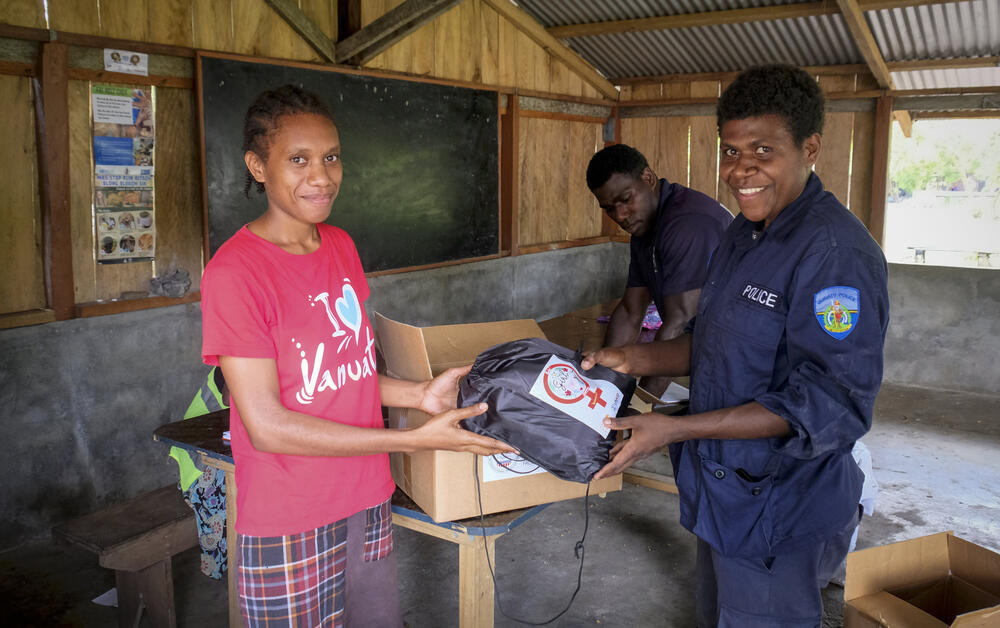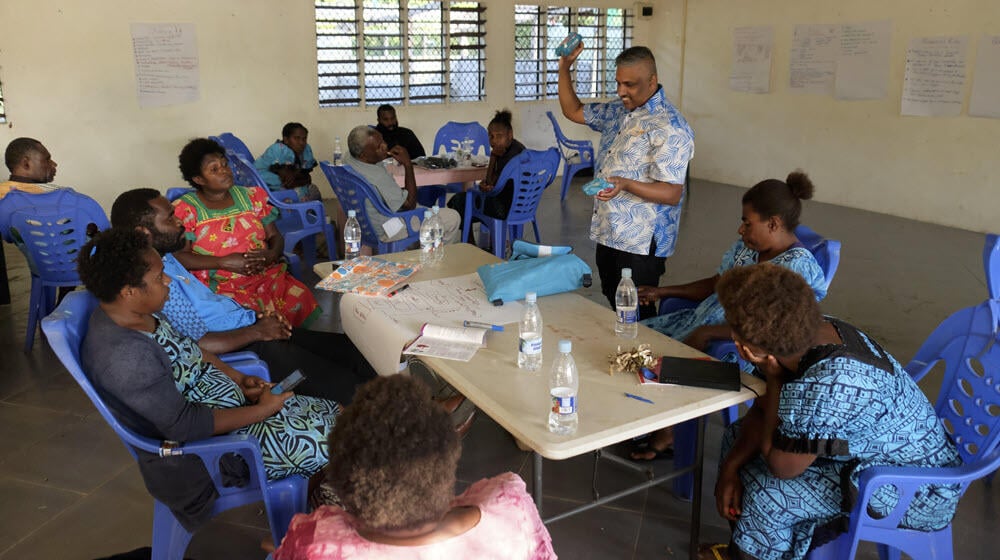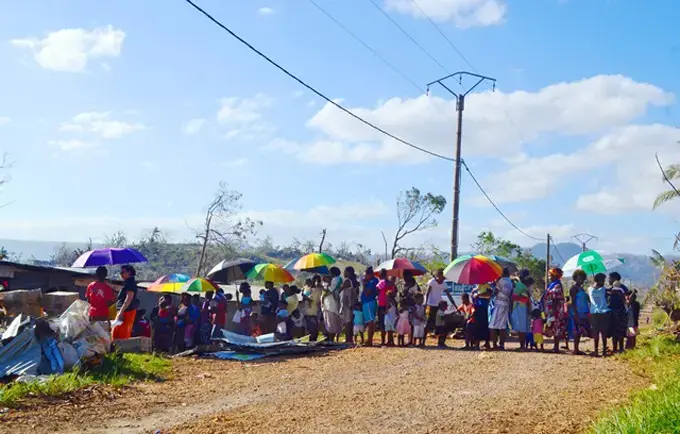19 August 2024
PORT VILA, Vanuatu – As the international community is commemorating the World Humanitarian Day (WHD) on 19 August - themed #ActforHumanity for 2024 - the United Nations Population Fund (UNFPA) is intensifying its support to Member States in the Pacific in strengthening resilience of disaster-prone communities, especially addressing the unique needs of women, adolescents and persons with disabilities during emergencies.
“After the Twin Cyclone, I really appreciated the ‘Dignity Kit’ from UNFPA.”
“When the ‘Twin Cyclones’ Judy and Kevin ravaged our village last year, my garden was destroyed, and the electricity and water stopped. The access road was damaged. The nearby clinic was closed. The women and girls who used the community church as an evacuation site with their families, were locked in the church when the cyclone worsened overnight and were unable to use the toilet outside.”
“That’s why I really appreciated receiving, after the cyclones, the UNFPA-supported ‘Dignity Kits’ with menstrual hygiene management items inside the basket.” Sabrina Brown, CEO of a local NGO Vanuatu Young Women for Change, shared with UNFPA Pacific Director Iori Kato and his team who visited the community in Teouma Zone 2 in Efate Island, 17 km away from the central Port Vila.
As one of the new ways to provide more timely support to vulnerable communities in times of emergency, the Vanuatu Department of Women Affairs (DWA) under the Ministry of Justice and Community Services has initiated its groundbreaking efforts at ‘pre-positioning’ essential relief items at those places in outer islands, much closer to the people who are anticipated to be affected by future cyclones, starting by procuring and installing warehouse containers in the provinces of Malampa and Tafea.
New decentralized “pre-positioning” initiative
To join forces, on the eve of WHD 2024, UNFPA Pacific donated “Dignity Kits” for the DWA to pre-position inside these warehouse containers in the Malekula and Tanna islands, with generous funding support from the United States Agency for International Development (USAID) Bureau for Humanitarian Assistance (BHA).
During the hand-over ceremony attended by the representatives from the Vanuatu Government, US Embassy and USAID-BHA, and UNFPA, the Director-General of the Ministry of Justice and Community Services, Mr. Arthur Faerua, thanked UNFPA’s contribution with the US government support, and pointed to the emphasis that the Government is increasingly placing upon preparedness and mitigation, emphasizing the connection between this proactive measure led by DWA and Vanuatu's traditional community practices of adapting to and preparing for disasters such as cyclones.
“This initiative represents the Vanuatu Government’s commitment to safeguarding the health, dignity, and well-being of women, girls, persons with disability and other most vulnerable populations, ensuring that they are supported and ready when crises strike, no matter how remote the island they live,” underscored the DG Faerua, recalling that Vanuatu suffered from as many as three mega-scale Tropical Cyclones - Judy, Kevin and Lola - in a matter of just eight months last year.
Chargé d'Affaires a.i. of the US Embassy newly opened in Vanuatu, Mr Jeffery Shelstad, highlighted during the Dignity Kits hand-over that emergencies do not affect everyone equally. “Women, girls, and individuals with disabilities face unique challenges that demand both empathetic and proactive responses. The disruption of essential services, including sexual and reproductive health care, significantly worsens these vulnerabilities, particularly in remote areas.”
“Anticipatory Actions” for women, youth, and the disabled
UNFPA Pacific is also joining the UN System-wide support to cyclone-prone Member States including Vanuatu with the “Anticipatory Actions” (AA), in line with the Gender Action Plan of the Sendai Framework for Disaster Risk Reduction 2015-2030. Its unique expertise and experiences from across the globe in sexual and reproductive health, youth empowerment, gender-based violence, and humanitarian data management, allows UNFPA to contribute tailored and effective approaches to Member States in designing the enhancement of community resilience, ensuring that anticipatory actions are gender responsive and inclusive, addressing the unique needs of women, adolescents, the elderly, persons with disability, and other vulnerable groups.
UNFPA Pacific also promotes the prioritization of the highest standards of ‘duty of care’ for humanitarian actors and service providers, to ensure a safe, supportive and respectful work environment for those engaged in emergency preparedness and response work. For instance, when UNFPA Pacific recently organized an online training programme for close to 200 service providers from 12 Pacific island countries, the course highlighted to the participants, the importance of safety protocols and support systems among humanitarian actors, and the need to collectively foster an inclusive and secure atmosphere and eliminate potential risks. “This is part of UNFPA’s commitment to #ActforHumanity too,” says UNFPA Pacific Humanitarian Coordinator, Ana Maria Leal.
"As we are commemorating the World Humanitarian Day 2024, UNFPA Pacific renews our commitment to accelerating our support to the climate crises prone small island countries in enhancing their institutional and community resilience. UNFPA strives for supporting the Pacific Member States in designing and implementing guidelines, programmes and activities that facilitate proactive anticipatory measures and also building on and strengthening local preparedness and response mechanisms. These efforts should be driven by strong national and local ownership and participation by the affected populations themselves including women, young people, persons with disability and the elderly,” adds Ana Leal. “As the Pacific proverb goes, 'In unity, there is strength; in preparedness, there is safety.”





